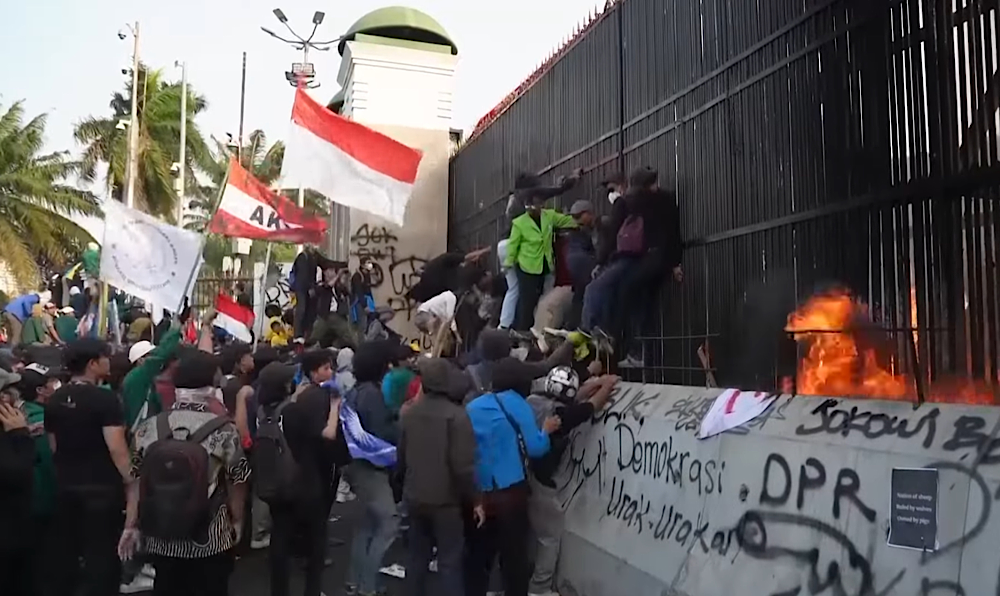Street protest blocks 'ad personam' law for Widodo clan
Demonstrations in several cities across the country just days before Pope Francis' visit. An attempt to reform regional elections to allow the president's 29-year-old son to run for governor of Central Java State and block the outgoing governor of the capital's reelection is in the crosshairs. Tensions around Parliament, turned into a “battleground” for a few hours.
Jakarta (AsiaNews) - Just days before Pope Francis' apostolic trip to the Asia-Pacific region, with a stop in Indonesia (the world's most populous Muslim nation), Jakarta yesterday was the scene of violent protests over “nepotistic policies” and “familist” conception of power of outgoing President Joko “Jokowi” Widodo.
There were many demonstrations in different cities, with the most impressive and participatory one going through the streets of the capital, registering clashes and tense moments: in the crosshairs was a controversial electoral reform bill that would strengthen the influence of the current head of state and his ally and successor, Prabowo Subianto, who will take office in October.
The law reform aims to eliminate the rule that prohibits people under the age of 30 from running in regional elections, the legitimacy of which has been reaffirmed and confirmed in recent days by a ruling of the Constitutional Court.
If approved by a parliamentary vote, the amendment would allow one of Widodo's sons, Kaesang Pangarep, to run for governor of Central Java State in elections in November. He is in fact 29 years old and a current run by him, with the minimum age limit set at 30, would be illegitimate.
Another article in the disputed draft would then make it effectively impossible for outgoing Jakarta Governor Anies Baswedan, who since the “grand alliance” between Joko Widodo and his former antagonist Prabowo Subianto has remained the largest opposition figure in the country, to run again.
The reform of an “ad personam” law would not be a new element: already at the time of the last presidential elections, in fact, the Assembly had approved a rule that allowed Widodo's eldest son, Gibran Rakabuming Raka, to run - by winning - for the office of vice-president, ensuring a succession of a quasi-dynastic nature to the country's top leadership. Hence the growing and widespread discontent among large sectors of society, especially among academics and university students, which later resulted in massive street demonstrations.
Jokowi has been repeatedly accused by the public of promoting his two sons (Gibran and Kaesang) and son-in-law Bobby Nasution to run for power in November's Pilkada.
The Indonesian Election Committee (Kpu or Komisi Pemilihan Umum) had supported changing the law to allow the president's son to run for governor. Close on its heels was the intervention of the Constitutional Court, which revoked the provisions issued by the Kpu, blocking Kaesang's candidacy.
Finally, the intervention of Parliament (Dpr Ri) in aid of the “presidential clan,” which sparked protests and triggered mass demonstrations in the country.
In the face of the rising tide of discontent, news came in the night that both Parliament and the Widodo administration are intent on following the Constitutional Court's directives and do not want to force their hands.
“We are committed to following the new regulations as laid down” by the courts on Aug. 20, Presidential Palace communications chief Hasan Nasbi said last night. And at the same time, “Dri Ri has suspended maneuvering to review the Constitutional Court ruling,” just as “the plan to revise the Kpu regulations is suspended,” added Sufmi Dasco Ahmad.
An attempt at détente promoted by the leadership, just days before the historic visit of Pope Francis eagerly awaited not only by Catholics, but by broad sectors of local politics and civil society, including Muslims.
The tension surrounds the upcoming regional elections in the archipelago, known as the “Pilkada” (pemilu kepala daerah), to be held next Nov. 27 in 37 provinces to choose the heads of 508 regencies or cities (mayors or governors). Roles that enjoy broad territorial powers and, therefore, are coveted by political leaders, parties and local administrators.
The attempt to force the hand of “Jokowi” has created strong discontent, fueling a popular uprising and a feeling of strong opposition to the current leadership, with memes and critical posts on social networks. Activist groups do not hide the danger of “constitutional emergency” and, therefore, have promoted mass demonstrations in many parts.
A violent protest was also reported in the Chamber of Deputies, after students broke down the protective gates and stormed the building, turning the institutions into a pro-democracy “battleground.” In this regard, several scholars and academics have publicly stated that “Indonesia is on the verge of abuse of power due to a blatant disregard for the law.”







.png)










